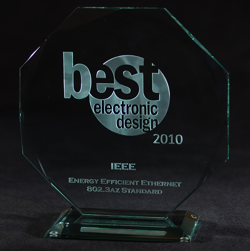Mike Bennett from the IT Division received an IEEE award sponsored by the IEEE Standards Association. The award was presented in recognition for leadership in developing IEEE Std 802.3az-2010™, more commonly known as Energy Efficient Ethernet or EEE in the industry. The standard was published in the fall of 2010. Ratification and publication of the standard marks a remarkable culmination of effort by the industry that was started by Mike Bennett, Bruce Nordman and Ken Christensen and resulted in the formation of a Task Force under the IEEE 802.3 Ethernet Working Group.
"It was rewarding to bring an idea that began as collaboration with Bruce Nordman in EETD and Dr. Ken Christensen at the University of South Florida to fruition as a standard, and it was a privilege to Chair a Task Force with such brilliant and talented engineers. New standard development can be challenging; nonetheless, Task Force members were collegial and truly professional. Additionally, without the great leadership from the Working Group, this project would not have been a success", said Bennett.
In addition to Mike receiving an IEEE-SA Working Group Chair award for his effort in leading the Task Force, Bruce and Ken received certificates of appreciation for their contributions. Electronic Design Magazine recognized the recently published standard by awarding the standard the 2010 Best Electronic Design in the Communications Wired category. The award was shared with Broadcom Corporation for their extensive EEE portfolio of products.
“This award is a great finishing touch, recognizing the hard work of the many talented engineers who contributed to the standard,” said Bennett. "Energy savings is a key pillar for networks of the future. This award underscores the importance of Energy Efficient Ethernet and is a testament to the work of the industry on the standard. Broadcom is shipping a wide portfolio of products that delivers on the promise of energy efficiency and our ongoing commitment to reduce the environmental impact of networking equipment," said Wael William Diab, Senior Technical Director in the Office of the CTO at Broadcom.
While end-user demand for bandwidth is driving energy consumption to higher levels, the new IEEE standard for Energy-Efficient Ethernet aims to reduce energy-use for many Ethernet links. Products supporting the new standard are already available and when fully deployed in the U.S., 5 Terawatt-hours per year, or enough energy to power 6 million 100 Watt light bulbs, will have been saved*. This is enough energy to light a 100 Watt bulb for every resident of Los Angeles for a year.
Additional Reading
IEEE 802.3az: The Road to Energy Efficient Ethernet, IEEE Communications Magazine
Broadcom Energy Efficient Networking
*Based on a conservative estimate of the energy that can be saved when links under typical use
